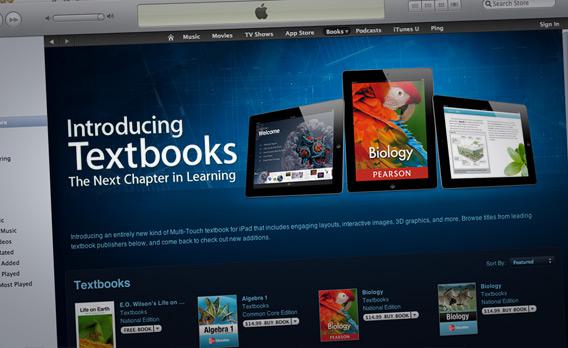The rules of the game dictate that any effort to move into America’s large and lucrative education publishing industry must be swaddled in pieties, and the electronic textbook initiative announced by Apple last week was no exception. Apple, which is normally willing to state that customers will be willing to pay a premium for superior design, was reduced to platitudes about how “when you integrate photography, video, audio, interactive objects, and Keynote animations right into the page, the material becomes so much more immersive and compelling.” The real truth, of course, is that Apple’s getting into this market to make money, not because they “really believe that technology can make a profound difference in the way teachers teach and students learn.” If digital textbooks are a game-changer for education, what they’ll change is the dollars and cents, cutting prices in a market where high-school textbooks currently sell for over a $100 a pop.
The arms race that will result from Apple’s entrance should produce cooler-looking textbooks, much as the success of the cool-looking MacBook Air has spurred competing laptop vendors to offer similar-looking Ultrabooks. But just because textbooks will look better, don’t expect students to be smarter. The widespread availability of snazzy laptops has not turned those of us who like them into better writers. The idea that more engaging interactive elements will induce indifferent students to become committed ones reeks of nonsense. The problem facing chemistry textbooks is that they’re about chemistry rather than, say, superheroes. Great teachers make chemistry seem interesting; bad teachers make chemistry seem dull. The textbook has very little to do with it.
After the Thursday announcement, I used my Twitter account to conduct an informal survey of whether teachers actually thought poor textbook quality was holding them back. They turned out to have plenty of complaints, but none were about the lack of Keynote animations. Teachers complain the books have incorrect or poorly written information—a problem Apple likely won’t fix. Much more troubling, said my teacher correspondents, are problems of cost and supply. Textbooks are very expensive, and many school districts cope with that problem by economizing on new purchases, leaving students with damaged or outdated ones. If these are the real problems we have with textbooks, digital texts could be a godsend.
The most daring idea is one that Apple isn’t trying yet. It could simply hire people to write textbooks, give them away for free, and pitch low-end iPads to school districts as a cheaper alternative to traditional textbook purchasing.
Unfortunately, the company seems to have shied away from that kind of daring frontal assault on the textbook industry, instead partnering with some incumbent textbook makers to show off the new digital format. This is much less promising. At a projected $15 price point, digital textbooks are cheaper than paper ones, but also kill off the used book market and require expensive hardware purchases. This casts doubt on the eventual savings to students or schools unclear.
But the potential for a true game-changer is out there in the form of Apple’s new iBooks Author software. The software is available for free to Mac owners and should make it relatively easy to put snazzy new digital textbooks together. This opens up the possibility that textbooks could be made the way they probably should have been made all along—by philanthropic institutions or government agencies rather than profit-seeking corporations. Freed from the need to physically manufacture, store, transport, and distribute books, it could become feasible for a university, a foundation, or even a large school district to simply hire someone to write the book.
Will anyone do it? Your guess is as good as mine. But they should. As it stands, K-12 education philanthropy in the United States is a game with hundreds of millions of dollars in play each year, even before you consider the universities. Freeing school districts from the costs of book acquisition by paying for the creation of high-quality free alternatives would be an excellent investment. Of course any philanthropist would hesitate to produce an Apple-exclusive product, but surely the Gates Foundation could be tempted to team up with its benefactor’s old rival Apple to break the textbook cabal. The good news is that the much-criticized user agreement associated with iBooks Author explicitly exempts books distributed for free from any restriction. In the short-term, of course, savings from free textbooks would be clawed back by the price of tablets. But schools are already spending bundles on computers, often with little to show for it. More to the point, the price of electronic gadgets falls steadily each year while textbooks keep getting more expensive. Apple’s technology plus a relatively modest investment from credible outsiders could not so much transform the $8 billion K-12 textbook market as destroy it altogether.
